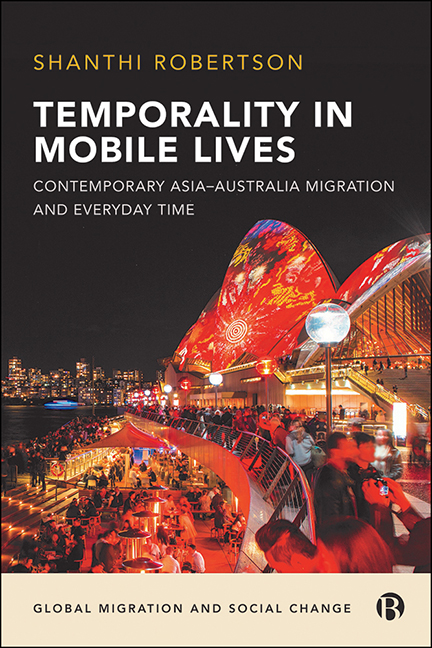Book contents
- Frontmatter
- Contents
- List of Figures
- Acknowledgements
- Series Preface
- Introduction
- 1 Chronomobilities: 21st-Century Migration and Lived Time
- 2 Asian Migrants of the Middle in Local and Global Context
- 3 Times of Work: Transified Workers and Contingent Careers
- 4 Times in Place: Moving, Dwelling, Belonging
- 5 Times of the Heart: Reconfiguring Intimacy
- Conclusion
- Notes
- References
- Index
3 - Times of Work: Transified Workers and Contingent Careers
Published online by Cambridge University Press: 04 January 2022
- Frontmatter
- Contents
- List of Figures
- Acknowledgements
- Series Preface
- Introduction
- 1 Chronomobilities: 21st-Century Migration and Lived Time
- 2 Asian Migrants of the Middle in Local and Global Context
- 3 Times of Work: Transified Workers and Contingent Careers
- 4 Times in Place: Moving, Dwelling, Belonging
- 5 Times of the Heart: Reconfiguring Intimacy
- Conclusion
- Notes
- References
- Index
Summary
I met Percy, from Shandong province in China, at a cafe outside his local public library in Perth, Western Australia's capital. Impeccably dressed in business-casual attire, 25-year-old Percy was initially courteously formal, as if he were attending a job interview. But he soon relaxed as we chatted about life in Perth, which happens to be my own hometown. Percy arrived in Perth to study gas engineering when he was 19. Western Australia appealed to Percy because the state's north was in the middle of an extraction boom, including in natural gas, so there would, he thought, be good job opportunities with multinational firms. He arrived with the “rough idea” that after graduation he would work in Australia in gas engineering “for a couple of years, if I still like it”, before deciding whether or not he wanted to return to China. As an only child, Percy told me that maintaining close contact with his parents was a top priority. Perth was also appealing, he said, because unlike the more populous east coast Australian cities it is on the same time zone as his hometown, “so it would be much easier to communicate with my family. There's no time difference.”
Percy supported himself by working as a waiter and a kitchenhand during his study, as well as volunteering with mentoring programmes and other student activities at his university. He was unsuccessful, however, in his applications for summer vacation internships with mining firms, a crucial first step in becoming competitive for graduate positions in the industry. By the time he graduated, the extraction boom was also winding down, and a job did not materialize. Percy saw the combination of his market disadvantage as a migrant and the unfortunate economic timing as the key contributions to his lack of transition to work in his field:
‘I didn't have my permanent residency back to the time I applied for my vacation work so regretfully without the real industry vacation work experience it would be very difficult to go to the industry directly. … We compete with local students, so they grew up here, they know everything here so they have the advantages to compete with us. … Always I ask myself, what if it was 2010 or 2011 when I looked for the vacation work?
- Type
- Chapter
- Information
- Temporality in Mobile LivesContemporary Asia-Australia Migration and Everyday Time, pp. 77 - 112Publisher: Bristol University PressPrint publication year: 2021

